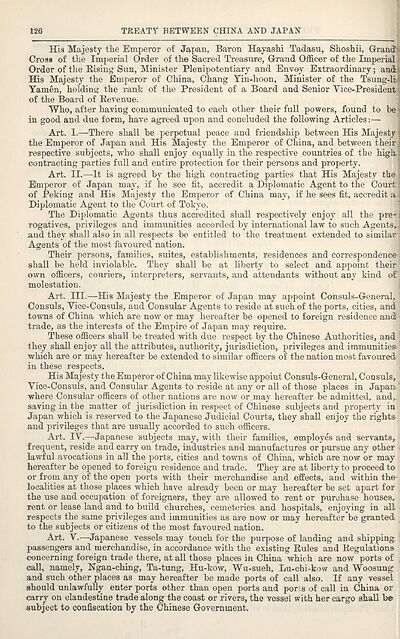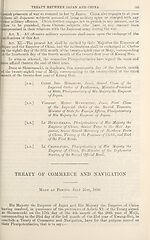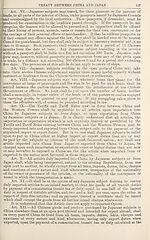1926
(178) Page 126
Download files
Complete book:
Individual page:
Thumbnail gallery: Grid view | List view

TEEATY BETWEEN CHINA AND JAPAN
His Majesty the Emperor of Japan, Baron Hayashi Tadasu, Shosbii, Grandii
Cross of the Imperial Order of the Sacred Treasure, Grand Officer of the Imperial ]i
Order of the Rising Sun, Minister Plenipotentiary and Envoy Extraordinary; andi.
His Majesty the Emperor of China, Chang Yin-hoon, Minister of the Tsung-lii
Yamen, holding the rank of the President of a Board and Senior Vice-President;)
of the Board of Revenue.
Who, after having communicated to each other their full powers, found to bo;
in good and due form, have agreed upon and concluded the following Articles:— |
Art. I.—There shall be perpetual peace and friendship between His Majesty]
the Emperor of Japan and His Majesty the Emperor of China, and between their j
respective subjects, who shall enjoy equally in the respective countries of tbe high]
contracting parties full and entire protection for their persons and property.
Art. II.—It is agreed by the high contracting parties that His Majesty the]
Emperor of Japan may, if he see fit, accredit a Diplomatic Agent to the Court
of Peking and His Majesty the Emperor of China may, if he sees fit, accredit a
Diplomatic Agent to the Court of Tokyo.
The Diplomatic Agents thus accredited shall respectively enjoy all the pre-i
rogatives, privileges and immunities accorded by international law to such Agents,,
and they shall also in all respects be entitled to the treatment extended to similar;
Agents of the most favoured nation.
Their persons, families, suites, establishments, residences and correspondence-
shall be held inviolable. They shall be at liberty to select and appoint their]
own officers, couriers, interpreters, servants, and attendants without any kind of
molestation.
Art. III.—His Majesty the Emperor of Japan may appoint Consuls-General, ‘
Consuls, Vice-Consuls, and Consular Agents to reside at such of the ports, cities, and \
towns of China which are now or may hereafter be opened to foreign residence and ]
trade, as the interests of the Empire of Japan may require.
These officers shall be treated with due respect by the Chinese Authorities, and ;
they shall enjoy all the attributes, authority, jurisdiction, privileges and immunities-;
which are or may hereafter be extended to similar officers of the nation most favoured |
in these respects.
His Ma jesty the Emperor of China may likewise appoint Consuls-General, Consuls, j
Vice-Consuls, and Consular Agents to reside at any or all of those places in Japan '
where Consular officers of other nations are now or may hereafter be admitted, and,. ■
saving in the matter of jurisdiction in respect of Chinese subjects and property in
Japan which is reserved to the Japanese Judicial Courts, they shall enjoy the rights
and privileges that are usually accorded to such officers.
Art. IV.—Japanese subjects may, with their families, employes and servants,
frequent, reside and carry on trade, industries and manufactures or pursue any other <
lawful avocations in all the ports, cities and towns of China, which are now or may
hereafter be opened to foreign residence and trade. They are at liberty to proceed to
or from any of the open ports with their merchandise and effects, and within the-
localities at those places which have already been or may hereafter be set apart for
the use and occupation of foreigners, they are allowed to rent or purchase houses,
rent or lease land and to build churches, cemeteries and hospitals, enjoying in all ■
respects the same privileges and immunities as are now or may hereafter be granted
to the subjects or citizens ot the most favoured nation.
Art. V.—Japanese vessels may touch for the purpose of landing and shipping
passengers and merchandise, in accordance with the existing Rules and Regulations
concerning foreign trade there, at all those places in China "which are now ports of ,
call, namely, Ngan-ching, Ta-tung, Hu-kow, Wu-sueh, Lu-chi-kow and Woosung
and such other places as may hereafter be made ports of call also. If any vessel
should unlawfully enter ports other than open ports and por s of call in China or
carry on clandestine trade along the coast or rivers, the vessel with her cargo shall be
subject to confiscation by the Chinese Government.
His Majesty the Emperor of Japan, Baron Hayashi Tadasu, Shosbii, Grandii
Cross of the Imperial Order of the Sacred Treasure, Grand Officer of the Imperial ]i
Order of the Rising Sun, Minister Plenipotentiary and Envoy Extraordinary; andi.
His Majesty the Emperor of China, Chang Yin-hoon, Minister of the Tsung-lii
Yamen, holding the rank of the President of a Board and Senior Vice-President;)
of the Board of Revenue.
Who, after having communicated to each other their full powers, found to bo;
in good and due form, have agreed upon and concluded the following Articles:— |
Art. I.—There shall be perpetual peace and friendship between His Majesty]
the Emperor of Japan and His Majesty the Emperor of China, and between their j
respective subjects, who shall enjoy equally in the respective countries of tbe high]
contracting parties full and entire protection for their persons and property.
Art. II.—It is agreed by the high contracting parties that His Majesty the]
Emperor of Japan may, if he see fit, accredit a Diplomatic Agent to the Court
of Peking and His Majesty the Emperor of China may, if he sees fit, accredit a
Diplomatic Agent to the Court of Tokyo.
The Diplomatic Agents thus accredited shall respectively enjoy all the pre-i
rogatives, privileges and immunities accorded by international law to such Agents,,
and they shall also in all respects be entitled to the treatment extended to similar;
Agents of the most favoured nation.
Their persons, families, suites, establishments, residences and correspondence-
shall be held inviolable. They shall be at liberty to select and appoint their]
own officers, couriers, interpreters, servants, and attendants without any kind of
molestation.
Art. III.—His Majesty the Emperor of Japan may appoint Consuls-General, ‘
Consuls, Vice-Consuls, and Consular Agents to reside at such of the ports, cities, and \
towns of China which are now or may hereafter be opened to foreign residence and ]
trade, as the interests of the Empire of Japan may require.
These officers shall be treated with due respect by the Chinese Authorities, and ;
they shall enjoy all the attributes, authority, jurisdiction, privileges and immunities-;
which are or may hereafter be extended to similar officers of the nation most favoured |
in these respects.
His Ma jesty the Emperor of China may likewise appoint Consuls-General, Consuls, j
Vice-Consuls, and Consular Agents to reside at any or all of those places in Japan '
where Consular officers of other nations are now or may hereafter be admitted, and,. ■
saving in the matter of jurisdiction in respect of Chinese subjects and property in
Japan which is reserved to the Japanese Judicial Courts, they shall enjoy the rights
and privileges that are usually accorded to such officers.
Art. IV.—Japanese subjects may, with their families, employes and servants,
frequent, reside and carry on trade, industries and manufactures or pursue any other <
lawful avocations in all the ports, cities and towns of China, which are now or may
hereafter be opened to foreign residence and trade. They are at liberty to proceed to
or from any of the open ports with their merchandise and effects, and within the-
localities at those places which have already been or may hereafter be set apart for
the use and occupation of foreigners, they are allowed to rent or purchase houses,
rent or lease land and to build churches, cemeteries and hospitals, enjoying in all ■
respects the same privileges and immunities as are now or may hereafter be granted
to the subjects or citizens ot the most favoured nation.
Art. V.—Japanese vessels may touch for the purpose of landing and shipping
passengers and merchandise, in accordance with the existing Rules and Regulations
concerning foreign trade there, at all those places in China "which are now ports of ,
call, namely, Ngan-ching, Ta-tung, Hu-kow, Wu-sueh, Lu-chi-kow and Woosung
and such other places as may hereafter be made ports of call also. If any vessel
should unlawfully enter ports other than open ports and por s of call in China or
carry on clandestine trade along the coast or rivers, the vessel with her cargo shall be
subject to confiscation by the Chinese Government.
Set display mode to:
![]() Universal Viewer |
Universal Viewer | ![]() Mirador |
Large image | Transcription
Mirador |
Large image | Transcription
Images and transcriptions on this page, including medium image downloads, may be used under the Creative Commons Attribution 4.0 International Licence unless otherwise stated. ![]()
| Asian directories and chronicles > 1926 > (178) Page 126 |
|---|
| Permanent URL | https://digital.nls.uk/196490487 |
|---|
| Attribution and copyright: |
|
|---|---|
| Description | Volumes from the Asian 'Directory and Chronicle' series covering 1917-1941, but missing 1919 and 1923. Compiled annually from a multiplicity of local sources and research. They provide listings of each country's active corporations, foreign residents and government agencies of all nationalities for that year, together with their addresses. Content includes: various treaties; coverage of conflicts; currencies and taxes; consular fees; weights and measures; public holidays; festivals and traditions. A source of information for both Western states and communities of foreigners living in Asia. Published by Hongkong Daily Press. |
|---|---|
| Shelfmark | H3.86.1303 |
| Additional NLS resources: |

